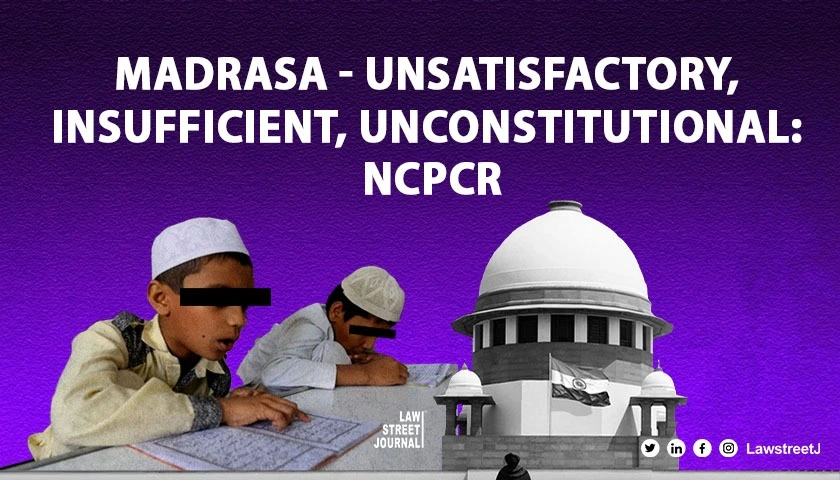NEW DELHI: The National Commission for Protection of Child Rights has told the Supreme Court that Madrasa works in an arbitrary manner and is being run in an overall violation of the Constitutional mandate, Right to Education Act and the Juvenile Justice Act, 2015.
"A Madrasa is not only a unsuitable/unfit place to receive ‘proper’ education but also in absence of entitlements as provided under Section 19, 21,22, 23, 24, 25, and 29 of the RTE Act. Further, Madrasa do not only render an unsatisfactory and insufficient model for education but also have an arbitrary mode of working which is wholly in absence of a standardised curriculum and functioning," it said.
In its written submissions to a matter related to Madarsa in Uttar Pradesh filed by Anjum Kadari, the NCPCR said it cannot be overlooked that a child getting education in such an Institution will be devoid of basic knowledge of school curriculum which is provided in a school.
On April 5, 2024, the Supreme Court has stayed the Allahabad High Court's order of March 22, 2024, striking down provisions of the Uttar Pradesh Board of Madarsa Education Act, 2004.
The court had then said it was of prima facie view that the law does not provide religious instruction and students are also imparted education in secular subjects like, Science, Mathematics and Social Studies.
The NCPCR said a school is defined under Section 2(n) of the RTE Act, 2009, which means any recognised school imparting elementary education. A Madrasa being out of this definition have no right to compel children or their families to receive Madrasa education, it said.
"Further, due to the absence of provisions of RTE Act, 2009, the Madrasas are also deprived of entitlement as in Section 21 of the Act of 2009 pertaining to School Management Committee due to which Madrasas lack committee for the purpose of monitoring its working because of which the parents are deprived of information regarding the progress of their children," it said.
In view of absence of proper curriculum, teacher eligibility, non-transparency/funding, and violations of the law of land, the Madrasa also failed to provide holistic environment to the children, it contended.
"Majority of Madrasa’s have no idea as to how to plan social events or extracurricular activities, like field trips, that could provide students with some level of experiential learning. Many children in the country attend Madrasas, however, they provide by and large, religious teaching with very little participation in the national mainstream education system," it said.
The NCPCR said the Board of Madrasa Education should not be regarded as an academic authority because it is merely a body with the power to conduct exams.
"It is a flagrant violation of a child's fundamental constitutional right to education to impart instruction that is entirely in the context of religion and that does not adhere to the requirements of the RTE Act, 2009, or any other applicable laws. Innocent children suffer as a result of the religious subject of education becoming institutionalised in Madrasas," it said.
The body pointed out Madrasa are getting Unified District Information System for Education (UDISE) Codes despite not fulfilling the norms and standards as per the RTE Act, 2009.
The fact of children getting education in government funded Madrasa including unmapped madrasas which are receiving funds from the state government is a clear cut violation of the law of land and such an education which is devoid of basic curriculum, eligibility and holistic environment cannot be furthered on the expenses of the State, it said.
It pointed out Section 1(5) of the RTE Act excluded the Madrasa from the purview of the statute. The Board of Madrasa Education contained various anomalies and flaws as being beyond the scope of the RTE Act.
"This irregular/incompetent curriculum out rightly leaves an impact on the academic and mental growth of the child which further leads a generation into a stagnant and underdeveloped future," it said.
The NCPCR said even though Madrasas are running across the country in all States/UT, but on the basis on the information available, only States namely Bihar, Chhattisgarh, Odisha, Uttar Pradesh, West Bengal, Madhya Pradesh, Rajasthan, Uttarakhand have Madrasa Board.
"The Commission have found various abnormalities in the curriculum published by these Madrasas Boards. Further, the Commission on perusal of the list of books available on the website of the Madrasa Board have also found objectionable content in Diniyat books being included in their curriculum," it claimed.
The child rights' body also said even non-muslim students have been studying in Madrasas in large numbers, where only about 16 per cent of the total number of children attending Madrasa education are muslims.
"Keeping children from professing any other religion apart from Muslim shall amount to violation of section 75 of the Juvenile Justice Act 2015 (JJ Act 2015). Not only are children's fundamental rights being infringed through grants, but the Juvenile Justice Act 2015 (JJ Act 2015) is also being disregarded," it said.
The NCPCR alleged corporal punishment, teaching Islamic education revolving around supremacy of Islam and sexual assault against minors and fudging the syllabus to come under garb of mainstream education is commonly reported in Madrasas.
It said the issue being raised in the instant petition is not and infact cannot be confined to only the State of Uttar Pradesh or the Madrasas functioning therein.
Since the elementary and core issue arising in the instant petition is found to be prevalent in large number of States having Madrasa Boards or running Madrasas, the NCPCR said the issues involving right to education of children would have pan India ramification, so due notice must also be served to all the States concerned.

















